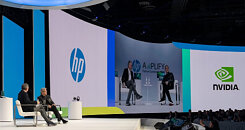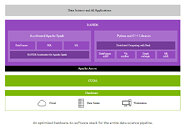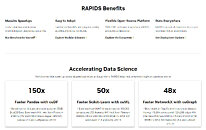T0@st
News Editor
- Joined
- Mar 7, 2023
- Messages
- 2,766 (3.68/day)
- Location
- South East, UK
| System Name | The TPU Typewriter |
|---|---|
| Processor | AMD Ryzen 5 5600 (non-X) |
| Motherboard | GIGABYTE B550M DS3H Micro ATX |
| Cooling | DeepCool AS500 |
| Memory | Kingston Fury Renegade RGB 32 GB (2 x 16 GB) DDR4-3600 CL16 |
| Video Card(s) | PowerColor Radeon RX 7800 XT 16 GB Hellhound OC |
| Storage | Samsung 980 Pro 1 TB M.2-2280 PCIe 4.0 X4 NVME SSD |
| Display(s) | Lenovo Legion Y27q-20 27" QHD IPS monitor |
| Case | GameMax Spark M-ATX (re-badged Jonsbo D30) |
| Audio Device(s) | FiiO K7 Desktop DAC/Amp + Philips Fidelio X3 headphones, or ARTTI T10 Planar IEMs |
| Power Supply | ADATA XPG CORE Reactor 650 W 80+ Gold ATX |
| Mouse | Roccat Kone Pro Air |
| Keyboard | Cooler Master MasterKeys Pro L |
| Software | Windows 10 64-bit Home Edition |
2024 will be the year generative AI gets personal, the CEOs of NVIDIA and HP said today in a fireside chat, unveiling new laptops that can build, test and run large language models. "This is a renaissance of the personal computer," said NVIDIA founder and CEO Jensen Huang at HP Amplify, a gathering in Las Vegas of about 1,500 resellers and distributors. "The work of creators, designers and data scientists is going to be revolutionized by these new workstations."
Greater Speed and Security
"AI is the biggest thing to come to the PC in decades," said HP's Enrique Lores, in the runup to the announcement of what his company billed as "the industry's largest portfolio of AI PCs and workstations." Compared to running their AI work in the cloud, the new systems will provide increased speed and security while reducing costs and energy, Lores said in a keynote at the event. New HP ZBooks provide a portfolio of mobile AI workstations powered by a full range of NVIDIA RTX Ada Generation GPUs. Entry-level systems with the NVIDIA RTX 500 Ada Generation Laptop GPU let users run generative AI apps and tools wherever they go. High-end models pack the RTX 5000 to deliver up to 682 TOPS, so they can create and run LLMs locally, using retrieval-augmented generation (RAG) to connect to their content for results that are both personalized and private.



Access to Accelerated Software
The new workstations can tap into NVIDIA's full-stack AI platform, including software that speeds the data science at the foundation of generative AI. The systems' Z by HP AI Studio platform—developed in collaboration with NVIDIA—links to NVIDIA NGC, a catalog of GPU-accelerated software for AI and data science. NGC includes NVIDIA NeMo, a framework to build, customize and deploy generative AI models. In addition, HP and NVIDIA announced that NVIDIA CUDA-X libraries will be integrated with the systems to turbocharge the data preparation and processing that's fundamental for generative AI.
Speedups for Data Scientists
The libraries include NVIDIA RAPIDS cuDF, which accelerates pandas, software used by nearly 10 million data scientists. "It used to take them hours and sometimes days to process data that now they can do in minutes," Huang said.
"This pandas library is insanely complex," he added, noting NVIDIA engineers worked for more than five years on reformulating the code so it can be accelerated with GPUs.


Entering a New Era
In tandem with the new systems, HP announced a partner training program developed in collaboration with NVIDIA. It will equip computer vendors to advise customers on the right AI products and solutions to meet their needs. Such programs pave the way for an industry that's entering an era where AI lets software write software.
"We've reinvented the computer. We've reinvented how software is written, and now we have to reinvent how software is used," said Huang. "Large language models, connected into other LLMs, will help solve application problems—that's the future."
View at TechPowerUp Main Site | Source
Greater Speed and Security
"AI is the biggest thing to come to the PC in decades," said HP's Enrique Lores, in the runup to the announcement of what his company billed as "the industry's largest portfolio of AI PCs and workstations." Compared to running their AI work in the cloud, the new systems will provide increased speed and security while reducing costs and energy, Lores said in a keynote at the event. New HP ZBooks provide a portfolio of mobile AI workstations powered by a full range of NVIDIA RTX Ada Generation GPUs. Entry-level systems with the NVIDIA RTX 500 Ada Generation Laptop GPU let users run generative AI apps and tools wherever they go. High-end models pack the RTX 5000 to deliver up to 682 TOPS, so they can create and run LLMs locally, using retrieval-augmented generation (RAG) to connect to their content for results that are both personalized and private.



Access to Accelerated Software
The new workstations can tap into NVIDIA's full-stack AI platform, including software that speeds the data science at the foundation of generative AI. The systems' Z by HP AI Studio platform—developed in collaboration with NVIDIA—links to NVIDIA NGC, a catalog of GPU-accelerated software for AI and data science. NGC includes NVIDIA NeMo, a framework to build, customize and deploy generative AI models. In addition, HP and NVIDIA announced that NVIDIA CUDA-X libraries will be integrated with the systems to turbocharge the data preparation and processing that's fundamental for generative AI.
Speedups for Data Scientists
The libraries include NVIDIA RAPIDS cuDF, which accelerates pandas, software used by nearly 10 million data scientists. "It used to take them hours and sometimes days to process data that now they can do in minutes," Huang said.
"This pandas library is insanely complex," he added, noting NVIDIA engineers worked for more than five years on reformulating the code so it can be accelerated with GPUs.


Entering a New Era
In tandem with the new systems, HP announced a partner training program developed in collaboration with NVIDIA. It will equip computer vendors to advise customers on the right AI products and solutions to meet their needs. Such programs pave the way for an industry that's entering an era where AI lets software write software.
"We've reinvented the computer. We've reinvented how software is written, and now we have to reinvent how software is used," said Huang. "Large language models, connected into other LLMs, will help solve application problems—that's the future."
View at TechPowerUp Main Site | Source





